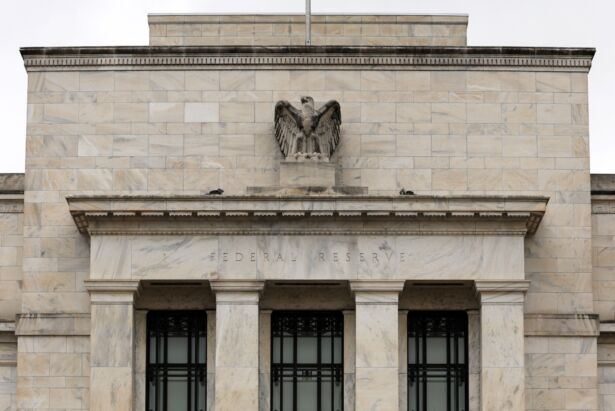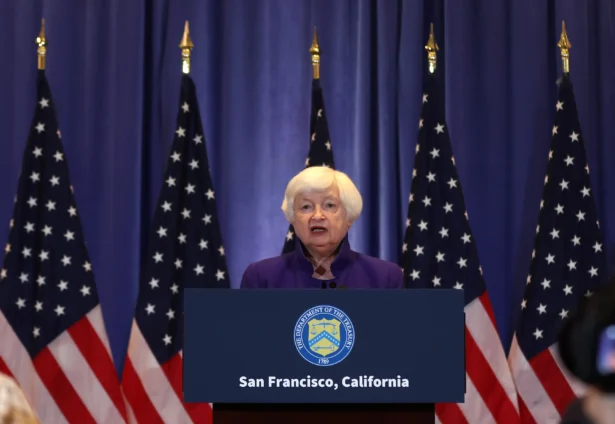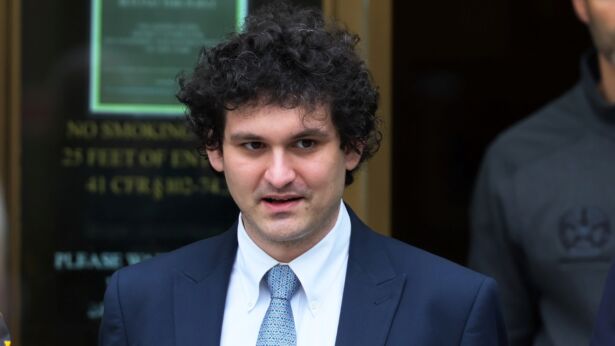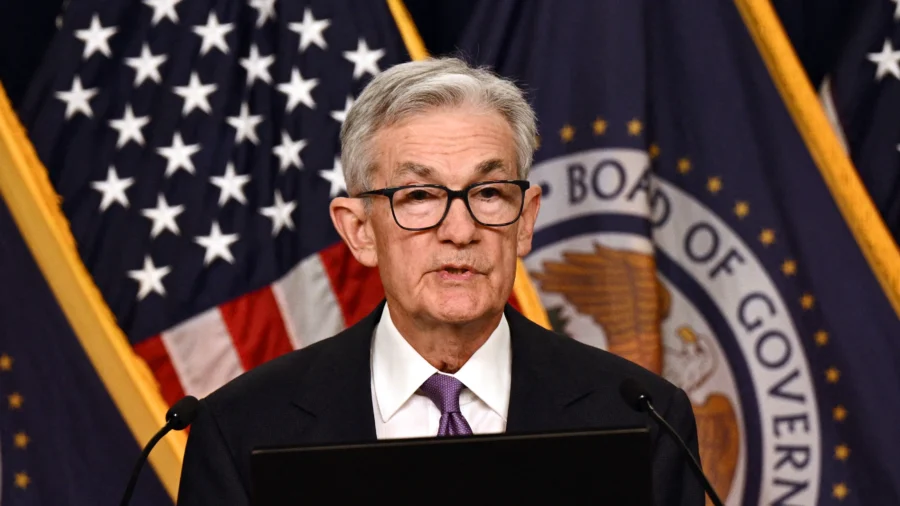Federal Reserve Chair Jerome Powell’s announcement at last week’s policy meeting that he planned to hold interest rates at their current levels had an immediate buoying effect on the financial markets, with the NASDAQ Composite and the Dow Jones Industrial Average hitting record highs.
The Dec. 13 announcement marked the third consecutive meeting where Fed officials have indicated their intention of keeping interest rates at present levels. Mr. Powell also alluded to the likelihood of at least three rate cuts in 2024, further stoking bullish sentiment on Wall Street.
Although Mr. Powell did raise the possibility that the Fed might have to raise interest rates next year, not lower them, the market is confident that significant rate cuts, up to as high as 125 basis points, could be on the horizon.
Clearly, many observers hail the Fed’s statements as an acknowledgement that the runaway inflation that has dogged President Joe Biden’s administration, made life stressful for working Americans, and hurt the president’s standing in the polls heading into next year’s election, is finally in retreat.
The U.S. inflation rate for the current calendar year stands at 3.1 percent, less than half last year’s rate of 6.5 percent and markedly lower than 2021’s figure of 7 percent.
There can be little doubt that these figures give hope to President Biden, who has been lagging in polls of likely voters compared to his leading Republican rival, former President Donald J. Trump.
But the massive spending that helped bring the economy to a precarious pass during the first three years of the Biden administration may yet have painful consequences for the economy, and for President Biden’s reelection prospects, economists have told The Epoch Times. The dip in inflation and the good news from the Fed may be hiccups rather than portents of long-term economic recovery, the economists warned.
The economists see a number of dire and destabilizing possibilities that may play out in 2024, from renewed inflation to a market retreat toward speculative assets whose entire value may disappear overnight. When it comes to dealing with the consequences of gargantuan spending packages, the country may be closer to the beginning of its ordeal than the end, the experts warned.

Unchecked Profligacy
In the view of Gary Wolfram, a professor in the economics department at Hillsdale College in Michigan, the causes of the inflation that has made life so difficult for so many people are not hard to identify.
“The reason that we have inflation is because from February 2020 to February 2022, we increased the money supply by 40 percent. If you increase the money supply by that ratio, you’re going to get inflation,” Mr. Wolfram told The Epoch Times.
“There was a big increase, and now the money supply has been declining again, so we’re getting a reduction in inflation,” he continued.
While this is good news for people who have struggled to put food on the table and fill their gas tanks, and keeping interest rates steady may feed the public’s sense of a broad turnaround, the Fed’s moves hardly take into account other aspects of the economic picture that might wipe out what modest progress has happened this year, Mr. Wolfram cautioned.
To the extent that President Biden has failed to anticipate potential consequences of a spending spree without parallel in U.S. history, he may pay the price for his shortsightedness in November.
“Overall, his policy has been a lot more government intervention, with a multi-trillion-dollar deficit, and the largest-ever increase in the national debt, and from a public policy perspective, I think that’s going to be a detriment,” Mr. Wolfram said.
According to Treasury Department figures, the fiscal year 2023 U.S. deficit ran to $1.7 trillion. So far in fiscal year 2024 (since Oct. 1), the federal government has spent $381 billion more than it has taken in.
These figures will surprise no one who has followed the fiscal policies of President Biden. At the end of December 2022, Mr. Biden signed off on a $1.7 trillion funding package for the federal government. In 2021, his American Rescue Plan Act of 2021—just one component of his Build Back Better program—ate up $1.9 trillion in stimulus funds.
Support for Ukraine in its war with Russia is yet another massive commitment. On Monday, National Security Council spokesperson John Kirby warned that funds for Ukraine’s defense will be quickly depleted after the expected additional package. This warning came on the heels of the president’s request in October for a $106 billion aid package for Israel, Ukraine, Taiwan, and border security.
The fiscal 2024 version of the National Defense Authorization Act, which passed the House in a vote last week, allocates yet another $886 billion in military spending.
Whether or not one agrees with the various components of these spending packages, they mark President Biden as the most profligate spender ever to occupy the White House. From the time he took office in January 2021 up till December 2023, the national debt soared $6.1 trillion, from $27.8 trillion to $33.9 trillion.

Who Will Buy Bonds?
The debt and deficit are not without significant downstream consequences, Mr. Wolfram believes.
“People are concerned about running multi-trillion-dollar deficits and the debt being more than 100 percent of gross domestic product, things we haven’t seen since World War Two. I do think that you get unintended consequences from these very large deficits,” he said.
One obvious consequence is the effect on people’s view of the government’s solvency and ability to make good on its debts. To illustrate his point, Mr. Wolfram cited the economic theories of the influential eighteenth-century Scottish economist Adam Smith.
“Look back to Adam Smith. What he said was that if you’re running deficits that are too large, then people may not buy your bonds. But then, part of the issue is, what’s the alternative? Chinese bonds? Euro bonds?” Mr. Wolfram said.
“So if people start saying, ‘I’m not going to buy U.S. government bonds,’ then the Fed may end up buying the bonds,” he added.
When the Federal Reserve buys Treasury bonds issued to banks, and takes the bonds off their books, the banks find themselves awash in great quantities of cash, and the value of money accordingly decreases, Mr. Wolfram pointed out.
“It increases the reserves of banks, but if the money supply’s up, there an inflationary pressure, and you’re going to pay for it in the form of inflation. Or with higher taxes, but that doesn’t seem to be in the cards, other than a wealth tax or something similar. It’s certainly not sufficient to deal with the issue,” he continued.
Unforeseen Woes
Jeffrey Hooke, a professor at John Hopkins Carey School of Business and a former investment banker, acknowledges that the end of 2023 has brought some good news and the outlook is not entirely bleak.
“I think that the economy is on a decent roll, and inflation looks like it’s going to level out at 4 or 5 percent. Unemployment is still very low,” he said.
Mr. Hooke is not surprised at the buoyancy on Wall Street in the immediate aftermath of the Fed meeting last week.
“The stock market has been very interest rate-driven over the last 12 months or so, extremely sensitive to what the Fed is going to do. The perception was that the Fed was not going to increase interest rates anymore, and lower interest rates propel growth,” he said.
But, of course, it is impossible to know what macro- or microeconomic events might complicate matters in 2024, and any optimism must be highly guarded, Mr. Hooke cautioned.
“The thing that could muck up the works might be another bank failure, probably related to a commercial real estate value decline. That could disrupt this optimistic scenario. Or something out of the blue, some kind of geopolitical crisis or political turmoil overseas that harms the supply of oil,” he said.
Even months after the waning of COVID-19, some sectors of the economy that depend on heavy human traffic are not back on their feet, and what happens to them does not happen in a void, he noted. The remote habits that took root during the pandemic are still largely with us.
“Some of the mid-tier banks have a lot of exposure to commercial real estate, and, if you follow it, the value of a lot of office buildings has fallen, and even, to some degree, that of smaller commercial properties like strip malls, because of people not shopping, not going to their offices downtown,” Mr. Hooke said.
The fiscal position of a number of the smaller banks is precarious, and 2024 might see some dramatic events, he warned.
“If there is a bank that is overly exposed, people may get nervous, and there could be a run on the bank like you saw with Silicon Valley Bank and others. That could get people running for the hills, they might take their money off the table, and invest in risky stocks and high-tech stocks,” Mr. Hooke said.
Mr. Hooke pointed to the recent troubles of First Republic Bank, which failed in May 2023 in the midst of a massive bank run, and the cryptocurrency exchange FTX, which fell apart virtually overnight after a tweet from Changpeng Zhao, the head of rival exchange Binance, stoked panic about the state of FTX’s finances.

Embracing Speculation
As Bitcoin recovers from its sharp decline in 2022, people may increasingly gravitate toward this highly speculative area of the market in 2024, Mr. Hooke predicted.
He said he sees this trend as already underway in spite of the open hostility of figures such as Securities and Exchange Commission (SEC) head Gary Gensler toward digital assets. Mr. Gensler has called cryptocurrency “a field rife with fraud, rife with hucksters,” and has dramatically stepped up SEC enforcement actions against crypto exchanges.
“A lot of people don’t care what they say, they’re going into this asset,” Mr. Hooke said.
Mr. Zhao’s guilty plea to money-laundering charges in a Seattle federal court last month, and his stepping down from the top post of Binance.US, has hardly slowed this trend, he observed.
“Bitcoin is going way up, and you have people piling into these risky assets much as they did a couple of years ago. There’s a theme between these dropping interest rates and these risky assets. When interest rates fall or people think they’re going to go lower, they look for alternative investments that they think are going to provide a higher return,” Mr. Hooke continued.
The performance of Bitcoin and inflation are closely related, believes Brian Domitrovic, chair of the history department at Sam Houston State University in Texas with a concentration in economic history.
“In my view, the global money market is looking for a reform in the monetary system—something more like the classical gold standard. When Bitcoin is high, it suggests that the private market is successfully producing a rival for the dollar. This serves as an impetus for the dollar to reform itself, perhaps in the classical direction. A classical reform of the dollar would result in an increase in its value. Therefore, Bitcoin falling is consistent with the reverse, a decline in the value of the dollar,” said Mr. Domitrovic.
The modest uptick in recent days flows not from bullishness on the economy’s performance under President Biden, but rather from the perception that he is unlikely to remain in office much longer and the economy will soon be in the hands of people who will avoid this administration’s most serious missteps, Mr. Domitrovic argued.
“I don’t think the Federal Reserve is very significant in terms of setting interest rates. There’s no market that is dominated by just one bit player. The renewed optimism we may be seeing is an effect of the market’s understanding that the Democrats will not have the presidency after the election,” he said.
The Epoch Times has reached out to the Treasury Department for comment.
From The Epoch Times


